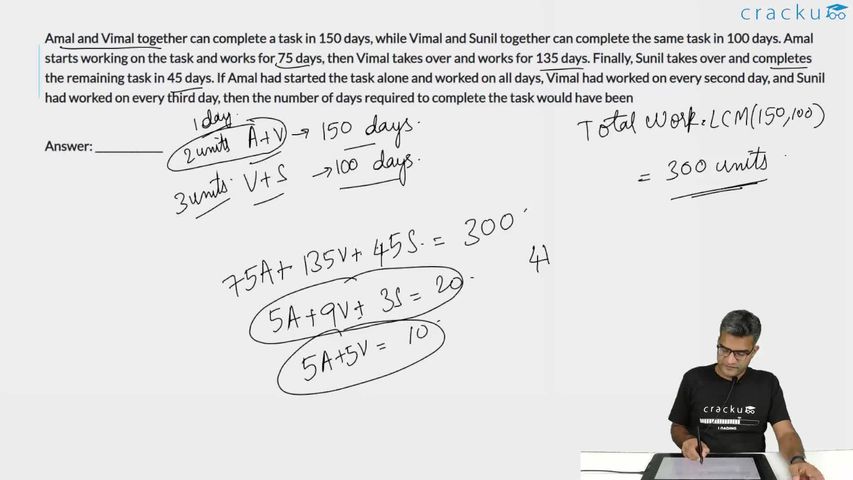Amal and Vimal together can complete a task in 150 days, while Vimal and Sunil together can complete the same task in 100 days. Amal starts working on the task and works for 75 days, then Vimal takes over and works for 135 days. Finally, Sunil takes over and completes the remaining task in 45 days. If Amal had started the task alone and worked on all days, Vimal had worked on every second day, and Sunil had worked on every third day, then the number of days required to complete the task would have been
Correct Answer: 139
We can take the work done by Amal, Vimal and Sunil to be A, V and S, respectively.
Let's take the total work they did to be T.
We are given the equations:
150A + 150V = T ...(1)
100V + 100S = T ...(2)
75A + 135V + 45S = T ...(3)
Adding (1) and (2), we get: 150A + 250V + 100S = 2T ...(4)
And multiplying (3) with 2 we get: 150A + 270V + 100S = 2T ...(5)
Subtracting (5) from (4), we get 10S = 20V or simply S = 2V
Using this in (2), we get the total work T to be 300V, and using that result in (1), we get A=V
Therefore, the work done by A, V and S equals V, V, and 2V units per day.
Now, in the question, we are given work cycles. To simplify the calculations, we should consider a time duration that is the LCM of the period taken by the three agents, which in this case would be 6
In 6 days, Amal will work for 6 days, doing 6V units of work.
Vimal will work for 3 days, doing 3V units of work.
Sunil will work for 2 days, doing 4V units of work.
So, in one 6-day cycle, 13V units of work will be done.
Dividing the total work (300V) by 13V we can see that in 23 cycles 299V units of work will be done.
These 23 cycles will be $$23\times\ 6\ =\ 138$$ days
The remaining 1V units of work will be done the next day.
Therefore, a total of 139 days will be required.
Video Solution

Create a FREE account and get:
- All Quant CAT complete Formulas and shortcuts PDF
- 38+ CAT previous year papers with video solutions PDF
- 5000+ Topic-wise Previous year CAT Solved Questions for Free



